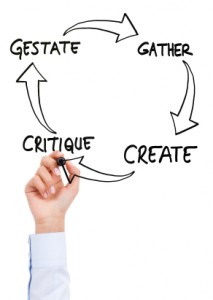 Even prodigies put in prodigious amounts of practice.
Even prodigies put in prodigious amounts of practice.
As long as the drive to play is in your blood, you’re going to want to get better. If you don’t, your career in the music business has officially stagnated. However, improving your live performances is tough!
In the moment, it’s a rush of emotion and nerves and (hopefully) with the electricity between you and the audience building and expanding the whole time until no one quite remembers what all happened in the third set.
Well, until the videos hit, anyway.
Your music business depends on you improving, but let’s face it: few of us actually enjoy watching or hearing recordings of themselves or are comfortable doing self-critique. So, here are a few hopefully-easy ideas for how to get the most out of your self-critiques, and to keep yourself focused on the most important thing: putting on a great show.
Five Ways To Critique Your Own Recordings
1)Pitch-check yourself.
Get a little distance through the wonders of technology. Assuming your music depends on harmonics, make sure you’re making the right ones. Try running a few songs through pitch-detecting software and see just how on you really were. It gives you specific, unambiguous places for you to focus on in your future jams and practices.
If your music doesn’t depend on tonalities, perhaps you could experiment with some for the novelty value!
2)Notice your stage mannerisms.
It’s not just what you sing, it’s also how you sing it. Show energy and personality. Whichever bits of you aren’t involving in making music should still be contributing to the show – head bobbing, foot-tapping, clapping, or just do the John Deacon thing of bouncing in place. Look for things to do to add to your performance.
And if you’re into shoegaze, then you just furiously stare downwards like you mean it.
3)Are you connecting with the audience?
All the great performers know how to work the audience. Keep them engaged. Talk to them, ask them questions, set up call-and-responses. When reviewing your tapes, look for opportunities where you might have paused and worked up the audience verbally, or with more gestures, to keep them focused on you and your band.
Building a wall between the band and the audience only worked once in the music business, and you’re not going to pull that one off again.
4)Watch your interactions with your bandmates.
Remember, unless you are totally solo, this is a team effort. Everyone in the band should have their chance to shine, and should be inspired to noticeably contribute to the overall effort. Sometimes, the best thing one performer can do is recognize when a bandmate is on a roll, and step aside so they can stay in their groove.
Learn from past mistakes in the music businesses: Don’t let ego ruin a group that’s got a good thing going.
5)Reflect on what you saw.
The point of going over your tapes isn’t to fret and stress over every missed note or opportunity. It’s to learn how to spot those opportunities in the moment, even when you realize you’ve been playing the same song for fifteen minutes and everyone’s happy with that. That’s the wisdom of experience that you can only get by doing a lot of performing, and then watching yourself again a day or two later.
And there are opportunities beyond spots where your hair let you down. Really.
Have fun.
Seriously, to get ahead in the music business, you have to enjoy what you do. Have fun, learn from the experience, and remember that the show must go on!












































Comments
No comment